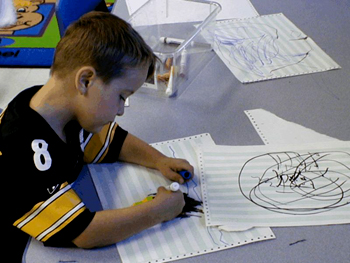Children think better when sad
Have you experienced a turbulent childhood with very few happy memories? According to British scientists, that may be good for your cognitive ability.
You might think that psychologists from Plymouth University (UK) hate children happy or just joking, but their conclusions are supported by some other research. For example, an experiment showed that adults in a happy mood performed poorer thinking tests than those who experienced a feeling of sadness.
To explore the same impact in children, Plymouth University's team of experts selected 30 volunteers aged 10-11. They let 15 children hear a funny symphony Eine Kleine Nachtmusik of Mozart music genius, while the other 15 listened to the sad symphony Adagietto by Gustav Mahler (Austria).
While listening to music, volunteers play a game in which they search for special space shapes - such as a triangle attached to a rectangle - in a picture. The group listening to the happy symphony took more time searching than the group listening to sad music.

Children's creative mind gets better when they are happy.Photo: corbis.com.
Dissatisfied with the results, the research team conducted a test with 61 children aged 6-7. Instead of listening to classical music, they watched three movies. They include Walt Disney's Jungle Book (fun and dancing music), The Last Unicorn (judged not to be unhappy) and a sad school in the animated film The Lion King. Most of the children in the group watched The Lion King cry when watching the scene of the lion Simba grappling with his father's corpse.
Scientists require all three teams to make the game choose the image as tested before. The results showed that the group watching music films took longer to choose from than the other two groups.
The research team offers quite a few explanations for their results. According to experts, mood can directly affect human cognitive ability. In a happy mood, people rarely ask questions about things they see, while sad feelings stimulate the process of analyzing and processing information to every part of the brain.
Similarly, those who are excited often focus on their joys, so they tend to ignore the details.
But parents have conditions for their children to live happily and happily, not to be confused. Many previous studies have shown that children always perform tasks that require better creative thinking and flexibility when they are happy.
The team thinks that the message parents can record is: Happy children are more likely to be poets and painters, while those who are sad and angry tend to become accountants. tablets.
- Origin and meaning of International Children's Day 1/6
- Treat 'vinegar' in children
- The 'survival' rule must teach your baby to avoid kidnapping
- Causes of scoliosis in children
- Little children look at relatives' faces, watch out for autism
- Patents for children in the early 20th century
- Mothers raise children more successfully
- Diet helps children increase height and weight
- The reason parents shouldn't force children to eat the food they don't want
- Internet makes children grow more slowly?
- 4 things to avoid when bathing children in winter
- Bacteria protect children from asthma
 'Fine laughs' - Scary and painful torture in ancient times
'Fine laughs' - Scary and painful torture in ancient times The sequence of numbers 142857 of the Egyptian pyramids is known as the strangest number in the world - Why?
The sequence of numbers 142857 of the Egyptian pyramids is known as the strangest number in the world - Why? History of the iron
History of the iron What is alum?
What is alum? Seeds became the 'secret weapon' that helped 4 children in a plane crash survive 40 days in the forest
Seeds became the 'secret weapon' that helped 4 children in a plane crash survive 40 days in the forest  Dangerous diseases that require vaccination from a young age
Dangerous diseases that require vaccination from a young age  If you put babies together without anyone teaching them to speak, will a new language emerge?
If you put babies together without anyone teaching them to speak, will a new language emerge?  The concubines, though favored by the king, had no children: An autopsy revealed the truth!
The concubines, though favored by the king, had no children: An autopsy revealed the truth!  How important are micronutrients to the human body?
How important are micronutrients to the human body?  Ancient Handprints on the Qinghai-Tibet Plateau: Unique Evidence of Human Evolution
Ancient Handprints on the Qinghai-Tibet Plateau: Unique Evidence of Human Evolution 